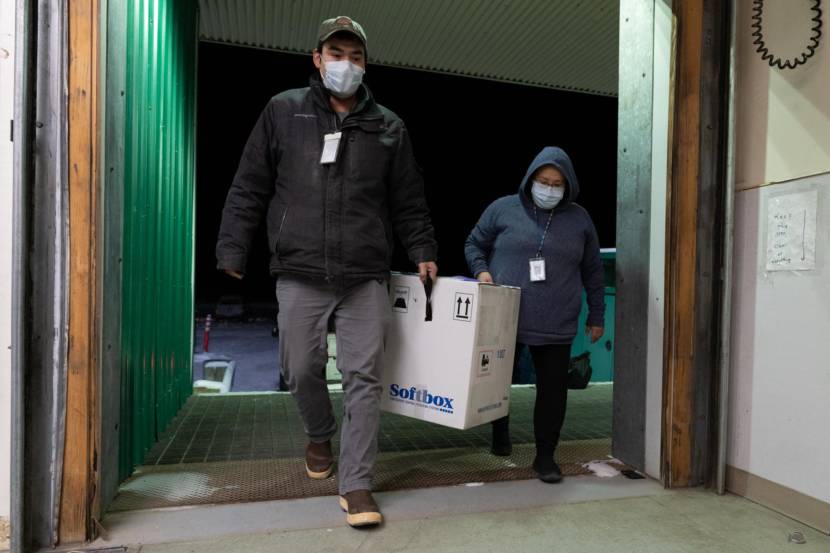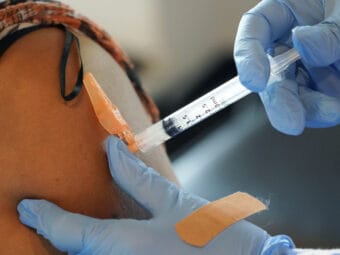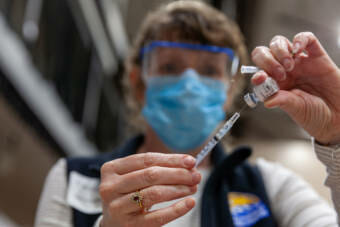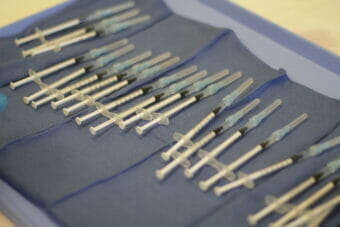
In the final weeks of the Trump administration, it announced a policy that would have had the effect of rewarding states that vaccinated people quickly. Of all 50 states, Alaska still has the highest per capita vaccination numbers. So the change might have gotten even more doses of the vaccine into Alaskans’ arms.
But two weeks into the Biden administration, the emphasis has shifted to equity instead of speed.
In an interview last Friday, Alaska’s chief medical officer discussed some of the contrasts.
Dr. Anne Zink said the Trump administration’s announcement that emphasized speed concerned her. She suggested it could invite gaming the system.
“If I wanted to do a bunch of vaccine really quickly, I would put a bunch of PODs in Anchorage for 20-year-old, tech-savvy people,” she said.
POD is a public health term for “point of dispensing” — basically, a pop-up, mass vaccination clinic. Her point was that it’s easier to get vaccine to the state’s urban areas and that younger people might have an easier time navigating an online appointment system.
The current system prioritizes people over 65 and does send vaccine to rural areas.
“I could get a lot of people vaccinated superfast that way,” she continued. “But that’s not going to decrease the morbidity and mortality associated to COVID in the same sort of way. So, I think that we have to balance equity at the same time. And we also have to make sure that it’s being distributed around the state. Which takes more time and energy, and is going to go a bit slower. So I think it’s important that we’re balancing those things at the same time.”
Of course, there was a presidential transition since that announcement was made, and the change that would have sent more vaccines to states administering them quickly didn’t take effect. Now, the Biden administration is also emphasizing equity in its vaccine effort.
Just Tuesday, the White House announced a partnership to send vaccines directly to pharmacies, and they’re picking pharmacies specifically that serve the people most at risk, including socially vulnerable communities.
Back in November, the Trump administration ignored advice from the Centers for Disease Control and Prevention to do something similar with the state allocations.
Zink hopes decisions the previous administration made that did help Alaska will last — especially parts served by the Indian Health Service.
“There’s a lot of flux still, a lot of changes,” Zink said. “But, we don’t know. We’re getting to know a lot of new partners in the transition. So, we’ll see.”
Zink said the new administration has also said that public health officials will get three weeks’ notice instead of a few days for how much vaccine to expect in upcoming shipments. As it is, the short notice makes planning the distribution a scramble.
“We thought we were going to get just over 6,000 doses in December. And then, with less than a week to go, we found out we were getting like, over 30,000 doses,” she said. “Our January allocation, we found out two days, three days before January. And same with February. So we’ve been on really, really tight — and it’s hard for communities to plan that and stand up point-of-care dispensing quickly.”
She said she’s also working with the new administration to be more transparent with its data on military and veterans vaccinations, which hasn’t been readily shared with state officials.
Zink said she’s excited to have more clarity from federal authorities, but it will take some to shake out.
For example, in a public health panel discussion Wednesday, Zink fielded a question about if Alaska can expect more vaccine this month.
“What I would start by saying is, we don’t know,” she said. “So, I’ve been in conversation with Operation Warp Speed today about potentially additional vaccine coming in the state at some point, as well as partnership with the federal pharmacy partnership, which may get vaccine separately.”
She also wrapped up her answer by saying, “We don’t know.”



